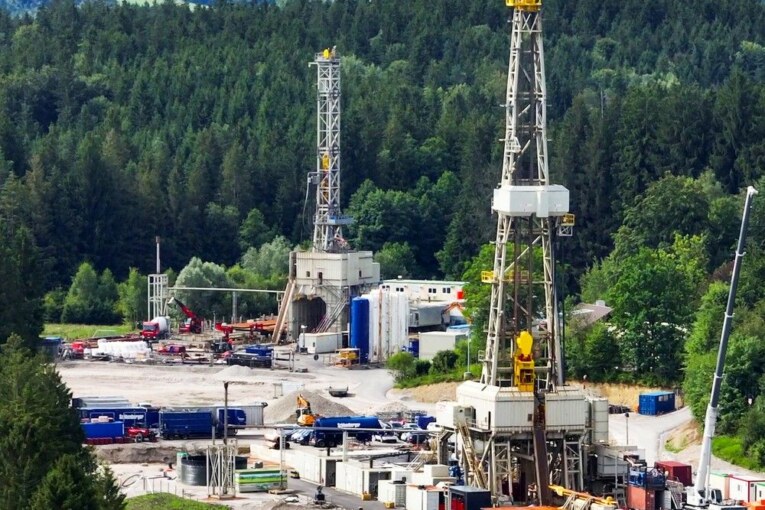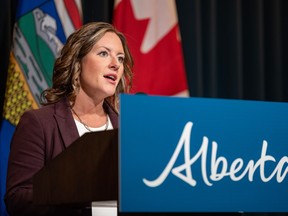
The CEO of Calgary-based cleantech firm Eavor Technologies is a busy man these days, preparing for the arrival of the head of Germany’s government at his company’s marquee project.
On Thursday, Eavor chief executive and co-founder John Redfern will host German Chancellor Olaf Scholz and Bavarian Prime Minister Markus Söder, as the Canadian company inaugurates its new geothermal development now being built in Europe.
It’s a commercial-scale project located near Geretsried, a German town south of Munich, and the facility is expected to cost more than $290 million to complete.
It follows up on a pilot project built near Rocky Mountain House in 2019, which was billed as “the world’s first closed-loop geothermal system.”
The development in Germany comes in the wake of a flurry of activity as the private company continues to draw investor interest.
Earlier this summer, Eavor announced a Series B equity round, which raised about $80 million, including $50 million from OMV AG, a large Austrian-based energy and chemicals company.
In March, the Canadian company was awarded a $135 million grant from the European Innovation Fund to support its new project, where drilling started this summer, leading to this week’s event and the German chancellor’s expected appearance.
“It’s a little bit crazy … We will have about 300 people there in a tent perched between the two drilling rigs that are drilling away as we speak,” Redfern said Monday night from Munich.
“We started construction last fall; we started drilling in June and we’re going to keep drilling nonstop until 2026. It’s a massive project.”

The development is expected to start producing energy next year and reach its full capacity in 2026. The company will build what it calls multiple underground radiators to produce zero-emissions energy for heating and power use.
Through its closed system, Eavor will circulate water through the radiators to extract heat, bringing it to the surface. Once complete, the project will generate 64 megawatts of thermal power and 8.2 MW of electrical power.
“It’s going to be producing power into the grid and heat into the local town and it’s going to be at a massive scale and it’s going to have a power plant right there,” said Redfern.
“We’re drilling out a huge subsurface radiator, kilometres below the surface, that just harvests the heat via conduction … It’s just like a radiator in your house, but a lot bigger and going in reverse — instead of radiating heat, it’s absorbing heat.”
Emissions Reduction Alberta (ERA), which committed $1 million in funding to the pilot project, noted the facility near Rocky Mountain House provided the validation needed to de-risk commercial opportunities for the technology around the world.
“It is a disruptive technology (that) provides clean, scalable, dispatchable heat and power,” ERA chief executive Justin Riemer said in a statement.
Recommended from Editorial
-

Breakenridge: Alberta’s pause on renewables undermines notion of a level playing field
-

Varcoe: Alberta minister says ‘Wild, Wild West’ wave of development triggered pause on renewables
Alberta Environment Minister Rebecca Schulz will attend the event in Germany this week. In an interview, she said the gathering will shine a light on geothermal advancements tested in the province.
Geothermal is an untapped resource in Alberta, she added.
“Alberta is uniquely positioned to succeed and to lead in this area and it really also builds on our oil and gas expertise,” Schulz said.
“This is definitely going to be one of our pieces moving forward as we look at our energy mix … I’m sure it’s only a matter of time before we see a project like this here in Alberta.”
However, the province recently announced a six-month pause on the Alberta Utilities Commission approving new renewable projects, including those involving geothermal power. Schulz discounted the idea it’s sending conflicting signals, calling it an opportunity to address outstanding concerns surrounding future renewable development.

Interest in geothermal energy is growing with its ability to be a dispatchable resource, and “the second half of the 2020s and beyond will really be a kind of era of geothermal,” said Sara Hastings-Simon, director of the University of Calgary’s master of science in sustainable energy development program.
But, geothermal is more expensive than wind and solar to generate power and Alberta’s current pause on renewables undercuts the minister heading to Germany to promote the technology, she noted.
“I don’t know how exactly they square that with having paused and introduced all this uncertainty in renewable energy back home,” Hastings-Simon said.
As with many large cleantech enterprises, geothermal companies will require a lot of money to scale up and develop commercial projects — and it’s been a difficult period for Canadian technology-based firms to attract funding over the past year.
A report issued Tuesday by the Canadian Venture Capital & Private Equity Association indicates Alberta-based companies raised $406 million in venture capital funding during the first half of this year, a 23 per cent drop from the same period a year ago.
“While investment activity has decreased compared to (the first half) of 2022, Alberta is on track to outperform the record 2022 investments of $782 million,” the report states.
In Calgary, 30 funding deals were recorded with companies raising $228 million, down from $470 million a year earlier.
“All it takes is one big deal to bump those numbers back up,” Technology Minister Nate Glubish told reporters Tuesday at a news conference.
Nationally, cleantech firms have attracted $519 million in funding this year, including $118 million flowing into geothermal and thermal startups.
At Eavor, the company has its sights on even bigger raises in the future this year, targeting a total of $180 million from its Series B round this year, Redfern said.
“To be honest, everyone who’s raising money right now, it’s not easy. You got to work at it,” he added.
“It’s not raining money from the skies. But it is possible if you’ve got a good case.”
Chris Varcoe is a Calgary Herald columnist.
You can read more of the news on source
